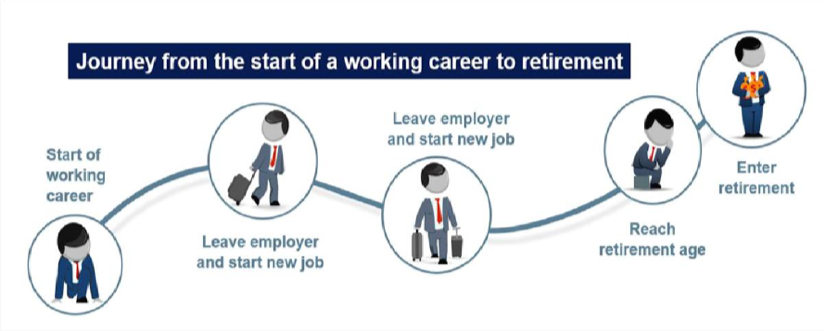Making decisions for retirement, particularly during times of uncertainty, can be tough. In this article, we consider the times during your life journey at which certain important financial decisions are made, and the impact that these decisions may have on your retirement goals.
Decisions you may need to make that affect your retirement
The illustration below shows potential points in a lifetime when one may need to make important financial decisions, that may affect the level of comfort during retirement.

Decisions made at the start of your working career
Decisions such as how much to save towards retirement and how long to save towards retirement, made at the beginning of your working career, may be the most impactful on retirement savings. This is because of future investment growth over your working career, as the longer you save towards retirement, the larger your retirement savings are expected to be, due to the effect of compounding interest. This means that saving more towards retirement at the start of your working career is valuable and provides you with a greater ability to increase your retirement savings and reach your retirement goal.
Decisions made when leaving your employer
If you leave your employer for any reason other than retirement, such as resignation or retrenchment, you have an important decision to make that may greatly affect your retirement savings. You could choose to keep your accumulated retirement savings invested, either in your current retirement fund or a preservation fund, or withdraw it as cash. While having additional cash at a single point in time may seem attractive, especially during times of uncertainty such as current times due to the Covid-19 pandemic, the effect of breaking the savings cycle for retirement savings may be significant. This is because your total savings at retirement is expected to be largely due to the growth on contributions rather than the contributions themselves, because of compounding interest. Preserving retirement savings (i.e. staying invested) provides the opportunity for your accumulated retirement savings to experience further growth until retirement and increases your ability to reach your retirement goal.
Decisions made when reaching retirement age
If you reach your employer’s chosen normal retirement age (the age that employees are expected to retire), you may have the option to delay accessing your retirement savings. This could mean that you agree with your employer to increase your retirement age and continue working, which would allow you to continue to contribute towards your retirement savings for a longer period of time. Alternatively, this could mean deferring your retirement, which means that you could continue to have your retirement savings invested in the fund even after you are no longer employed. Both options allow your retirement savings to benefit from potential future growth due to compounding interest. A few years of delaying or deferring retirement is likely to have a positive impact on your retirement savings, thereby increasing the likelihood of reaching your retirement goal.
Decisions made when entering retirement
You also need to decide how to use your retirement savings when entering retirement. This is an important decision to make, as it determines whether you have an income that covers your needs for the duration of your retirement. You have the option to cash out all or a portion of your retirement savings or invest it in an annuity, which will provide you with an income during retirement. There are three main types of annuities that provide different income options for different needs. They are:
- A living annuity, which allows you to stay invested in the market and manage your investment during retirement.
- A with-profit annuity, which guarantees an income for life with increases that are linked to market returns.
- A guaranteed life annuity, which guarantees an income for life with chosen future increases that are guaranteed.
The tax implications of your retirement decisions
It is important to consider the tax you could incur based on the decisions you make. Retirement contributions are exempt from income tax (subject to prescribed maximums in the Income Tax Act). If you choose to cash out retirement savings at any point when leaving your employer or retiring, income tax is applicable on the amount cashed out. If you choose to purchase an annuity, only the income you receive will be subject to income tax, which ultimately defers the total amount of tax you pay.
Assistance with decisions you make that may affect your retirement
It may be a daunting task to know what decisions to make, or how these decisions may impact your retirement outcome. Your fund financial adviser can help and advise you to make the most suitable decisions based on your retirement needs.
For more details, visit www.liberty.co.za